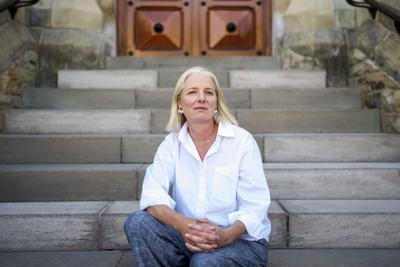OTTAWA—Former Liberal environment minister Catherine McKenna is casting doubt on attempts to strike a “grand bargain” between the federal government and the fossil fuel industry, as she stresses the importance of Canada’s greenhouse emissions targets under the international Paris Agreement that Prime Minister Mark Carney has recently downplayed.Â
In an interview with the Star to mark the release of her new memoir, McKenna avoided directly criticizing Carney’s government, stating repeatedly that she is waiting to see more details from the administration’s promised climate plan.Â
But she questioned the general idea of a “grand bargain” — touted recently by Carney himself — to exchange new fossil fuel infrastructure for meaningful greenhouse gas reductions from Canada’s heaviest emitting sector, arguing past experience suggests it won’t work out.Â
McKenna, who was environment minister from 2015 to 2019, pointed to the government’s vision then to purchase and finance the construction of the Trans Mountain oil pipeline expansion, which was billed as a measure that was paired with strong climate policies like carbon pricing. Total emissions from the sector have since stayed relatively flat, according to the from the federal government, while heated political opposition to federal climate policy preceded Carney’s decision earlier this year to scrap the national consumer carbon price.Â
“It’s been shown that oil and gas actually will not act. And so giving them more money or incentives as part of some grand bargain — when they haven’t done the minimum now, including living up to their own commitments — is a real problem,” McKenna said.Â
“We tried to do a grand bargain. And we failed.”Â
Last week, when announcing the first projects the federal government wants to fast-track through Carney’s new special “nation-building” legislation, Carney said a new “grand bargain” would require fossil fuel companies to build their long-planned Pathways Alliance carbon capture , an initiative that could receive public dollars through federal tax credits. If it moves forward, Ottawa would be open to green-lighting a new oil pipeline, Carney said, suggesting his government could use its new “nation-building” legislation to skirt existing project assessment rules and an oil tanker traffic ban off British Columbia’s north coast.Â
On Tuesday, executives from major energy companies sent an open letter to Carney that praised efforts to build new projects faster, but said any “grand bargain” needs further changes to actually happen. Their demands include repealing the tanker ban and the federal assessment law, ditching the emissions cap, reducing timelines for project approvals, scrapping the national industrial carbon price and providing more Indigenous loan guarantees to help communities buy into resource projects.Â
The Star reported in June that the federal government is open to removing its long-promised emissions cap for the oil and gas sector if the Pathways project gets built, with sources saying the carbon development could achieve similar emissions reductions.Â
Carney and his current environment minister, Julie Dabrusin, have also recently avoided pledging Canada will achieve its emissions targets under the Paris Agreement for 2030 and 2035, with Carney saying last week that he will strive for “results, not objectives.”
The government insists, however, that it will continue to drive down emissions, in part by improving industrial carbon pricing, but has recently emphasized the longer term goal of hitting “net zero” emissions by 2050.Â
For McKenna, now the chair of a United Nations expert group on net zero emissions, the Paris targets are crucial.Â
“I’m not in government now, right? It’s up to the government to chart its course. But I think people will be looking at, are our overall emissions going down? And targets are important. The Paris Agreement is our best chance of tackling climate change,” McKenna said.Â
“Every country agreed that it would do its part. Canada needs to do its part like everyone else.”
Her new book, Run Like A Girl, traces her life and career in politics, from her time as Justin Trudeau’s environment minister to her recent work with the UN. The book includes a section that describes how it was difficult for McKenna to book a meeting with Trudeau, while she argued the carbon pricing policy needed to include rebates to consumers instead of funnelling revenues to green initiatives. She writes that Trudeau “existed like a fortress,” and told the Star this week that she believes this leadership style contributed to problems for his government, including the SNC-Lavalin scandal, when former justice minister Jody Wilson-Raybould accused Trudeau and his office of pressuring her to intervene in a prosecution against the Montreal-based engineering giant.Â
McKenna also blames the Trudeau government for hastening the demise of the federal consumer carbon price. In the book, she slams the government’s October 2023 decision to remove the carbon price from home heating oil while bolstering programs to help people switch to lower-emitting electric heat pumps as “beyond cynical” and “stupid.”Â
In her interview with the Star, McKenna said she believes Trudeau “really cared about climate action” but stressed that pushing climate policy is difficult. The current political moment is also dispiriting, she said. Since returning to office, U.S. President Donald Trump has withdrawn the United States — the world’s emitter — from the Paris Agreement, while promising to crank up fossil fuel production and roll back environmental regulations.Â
When it comes to the Carney government, McKenna expressed hope meaningful action will continue, noting how he is known in climate policy circles for his advocacy for a low-carbon transition.Â
The government has promised to release its climate “competitiveness” plan later this year.Â
Error! Sorry, there was an error processing your request.
There was a problem with the recaptcha. Please try again.
You may unsubscribe at any time. By signing up, you agree to our and . This site is protected by reCAPTCHA and the Google and apply.
Want more of the latest from us? Sign up for more at our newsletter page.



























To join the conversation set a first and last name in your user profile.
Sign in or register for free to join the Conversation